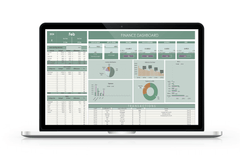Paying off debt isn’t a sprint—it’s a marathon. And as with any long-distance race, motivation can dip. Maybe the numbers aren’t dropping fast enough, or unexpected expenses are throwing off your plans. Sound familiar?
The truth is, staying motivated is just as important as having a repayment strategy. Without consistent motivation, even the best plan can fall apart. In this guide, we’ll explore five powerful (and practical) ways to stay motivated on your debt-free journey—so you don’t just start strong, but finish strong too.

Why Motivation Matters When Paying Off Debt
When your financial goals stretch over months or years, it’s easy to lose steam. That’s why understanding your emotional connection to debt freedom is just as crucial as the math behind it.
Motivation helps you:
- Push through the plateaus when your balance barely moves.
- Avoid burnout and decision fatigue.
- Stay consistent, even when life throws curveballs.
Let’s break down the tools that keep you going, even when the journey gets tough.
1. Celebrate Small Wins
Paying off debt is hard work—so every milestone deserves recognition. Whether it’s clearing your first £100 or saying goodbye to a credit card, celebrating small wins builds momentum.
Here’s how to make those wins visible:
- Use a debt payoff tracker (like a printable thermometer or colouring sheet).
- Create a “debt-free countdown” on your fridge or mirror.
- Journal your progress monthly—celebrate even when it feels small.
Each tiny celebration reminds you: You’re moving forward.
2. Set Milestones and Reward Yourself (Without Guilt)
Just like in a video game, milestones give you something to aim for. Break your overall goal into smaller chunks, like every £500 or 10% paid off.
Reward ideas that keep motivation high:
- Enjoy a low-cost treat: a coffee date, new book, or bath soak.
- Do something fun that doesn’t cost money—like a hike or movie night at home.
- Share your progress with a friend who “gets it.”
These intentional rewards create a sense of achievement—and they help you avoid burnout.
3. Create a Support System
Debt can feel isolating, but it doesn’t have to be. When you share your goals with the right people, you multiply your motivation.
Find your tribe:
- Join online communities like r/UKPersonalFinance or debt-free Facebook groups.
- Check in weekly with a friend working toward a similar goal.
- If you’re comfortable, share small wins on social media.
Accountability keeps your energy up—and your progress steady.
4. Automate What You Can
Sometimes, the best motivation is removing temptation altogether. Automation keeps you consistent, even when your willpower dips.
Try these simple automations:
- Set up automatic overpayments to your highest-priority debt.
- Use banking apps to round up purchases and apply the change to debt.
- Schedule weekly reminders to check your progress.
Bonus: Automation turns your goal into a habit—and that’s where real change happens.
5. Remind Yourself of Your “Why”
Behind every financial goal is a deeper reason—freedom, peace of mind, more family time, less stress.
Keep your “why” front and centre:
- Write it on sticky notes and put them around your home.
- Create a vision board with photos of your dream life post-debt.
- Journal how being debt-free will feel.
When motivation slips, revisit these reminders—they're the fuel that powers your persistence.

Common Pitfalls That Drain Motivation
It’s natural to feel discouraged. But here are a few traps to avoid:
| Pitfall | Why It Happens | What to Do |
|---|---|---|
| Not redirecting paid-off debt money to the next balance | It feels like “extra” money is now available to spend | Immediately roll that amount into the next debt to speed up your payoff |
| Not BudgetingSpending without awareness delays your goals and can increase anxiety. | Spending without awareness delays your goals and can increase anxiety. | Create a simple monthly plan and review it regularly. |
| Over-restricting your spending | Leads to burnout | Build in small “fun funds” to stay balanced |

When to Seek Professional Help
If you feel overwhelmed, you’re not alone—and help is available.
Consider reaching out if:
- You’re missing payments or relying on credit to get by.
- The stress is affecting your mental or physical health.
- You don’t know where to begin.
Organisations like StepChange or National Debtline offer free, confidential advice.
FAQs: Staying Motivated While Paying Off Debt
Q: How do I stay motivated when my progress feels slow?
A: Focus on small wins. Use visual trackers and celebrate each step forward.
Q: Is it okay to have “cheat days” in my plan?
A: Absolutely. Occasional treats help you stay the course long term.
Q: Why do I feel guilty spending money during debt repayment?
A: It’s common—but budgeting small joys into your plan can strengthen your resolve.
Q: Should I change my plan if I feel stuck?
A: Yes. It’s okay to pivot. Try a new method, increase income, or revise your goals.
Q: Do motivational podcasts or books help?
A: Definitely. Audiobooks and podcasts can give you a fresh mindset boost—especially on tough days.
Conclusion: Motivation Is Your Best Ally
You already have what it takes to become debt-free. But staying motivated is the real secret weapon. Whether it’s celebrating your first milestone or reminding yourself of your “why,” small steps matter more than you think.
Take the next one today—and keep going. Your debt-free life is waiting.





